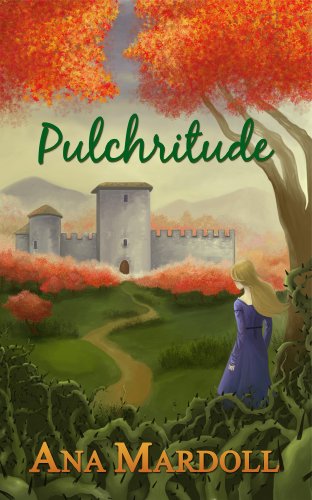
Pulchritude is a novel by American author Ana Mardoll. It's a Grimmification of the de Villeneuve fairy tale "Beauty and the Beast", in which a beautiful young woman is given by her father to a dangerous beast in exchange for his own life. In the original tale, the Beauty falls in love with the Beast, breaking the curse and returning him to his human form; in the re-telling, the tale takes a more cynical turn.
This novel provides examples of:
- Ambiguous Syntax: The fairy instructs the Beast to "find" love. She means from within.
- Anachronism Stew: The novel includes a biracial marriage between a white man (Cienzo) and a black woman (Venizia) in what otherwise appears to be pre-Renaissance Italy. Vague references are dropped of a multiracial culture in the nearest port city, but the local rural village sees nothing overly unusual about the marriage.
- Artistic License: The author freely admits that many elements of the Culture Chop Suey were added for artistic purposes, including the use of modern vernacular and the biracial character cast.
- Black Eyes of Evil: When Ezio is changed into the Beast, his pupils expand such that his eyes are almost completely black and are only ringed by their former brown iris. This detail disturbs the people who interact with him.
- The Consigliere: The Beast's adviser, Guerrino, tries to warn him about the fairy and avert the curse. He's also the only reason the prince survives the aftermath, by virtue of hiding him and then providing for him.
- Culture Chop Suey: The local rural village evokes pre-Renaissance Italy, but with modern vernacular, biracial marriages, female inheritance, and a modern reference to mental illness.
- Curse Escape Clause: Evoked deliberately by Guerrino when counseling the newly-changed prince: all curses have a counter-curse that will allow everything to return to normal.
- Downer Ending: Deliberately invoked in the novel's product description. Bella dies and the Beast's curse becomes permanent.
- Exactly What It Says on the Tin: "Pulchritude" means 'beauty'. Evoked in the tag line "...an ugly tale of beauty."
- Fantasy Counterpart Culture: The novel is set in a fantastical version of pre-Renaissance Italy, but with the addition of fairy tale magic, transmogrification curses, and socially-condoned biracial marriages.
- I Just Want to Be Beautiful: Bella struggles to maintain her beauty as her only source of social power; Ezio labors to regain his human form in order to reclaim his social position.
- Mama Bear: When Cienzo suggests giving away Venizia's daughters to the Beast in order to save his own life, Venizia throws the book at him.
- A Match Made in Stockholm: The Beast deliberately uses psychological pressure on his prisoner in an attempt to manipulate her into loving him. Guerrino privately doubts that this will satisfy the curse.
- Missing Mom: All we really know about Bella's mother is that she died from an illness, and that her death strained the relationship between Cienzo and Bella.
- No Hugging, No Kissing: Because the Beast's fingers have been replaced with razor-sharp claws, he can't touch Bella without risking serious injury to her.
- Parental Neglect: Cienzo leaves Bella home alone during his trips to the port city, remarries without introducing his daughter to his new wife, and becomes angry with Bella when she asks for money. Later, he will give her to the Beast in exchange for his own life, and actively obstruct attempts to rescue her.
- Parental Substitute: Venizia tries to be this for Bella, and married Cienzo in expectation of being a mother to his daughter. In the end, she takes the necessary initiative to locate and bury her step-daughter.
- Prophetic Fallacy: Both the Beast and Guerinno are certain they know exactly how to break the curse.
- Senseless Sacrifice: Bella is set up to prove her love in a test that ultimately takes her life. Unfortunately, it was the Beast who needed to prove his love, and not the other way around.
- Shoot the Shaggy Dog: As in the original fairy tale, the Beauty has a strained relationship with her family, is traded off by her father to a monstrous beast, and lives in dreary captivity as his prisoner. Unlike the original, the Beauty never manages to break the curse because it was never in her power to do so. She dies and the Beast remains cursed.
- Sticky Fingers: Bella has a chronic case, raiding both her step-sister's room, the local village market, and the prince's castle for whatever she thinks will help her survive.
